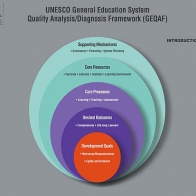
International, regional and national assessments of learning outcomes testify to the poor quality of education in many countries around the world. Both developed and developing countries are aware of the quality crisis and its development consequences. Most education reform programs therefore include education quality improvement and the enhancement of equity among the key strategic objectives.
Despite all the efforts, the education quality challenge persists, and the EFA quality goals are dauntingly off track. One of the major obstacles is the lack of tools for conducting systemic analyses of critical constraints hampering the achievement of education quality goals.
Therefore, UNESCO, in collaboration with its Member States, developed the General Education Quality Analysis/Diagnosis Framework (GEQAF).
Its objective is to strengthen national capacity in assessing education systems based on local knowledge and expertise. The diagnostics/analysis guided by the GEQAF should strengthen both the qualitative and quantitative knowledge base required to design and implement responsive, targeted and timely quality improvement interventions.
The GEQAF contains 15 Analytical Tools covering all key aspects of an education system taking into account the interdependencies and linkages between the various aspects.